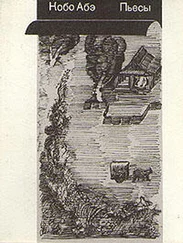Кобо Абэ - The Ark Sakura
Здесь есть возможность читать онлайн «Кобо Абэ - The Ark Sakura» весь текст электронной книги совершенно бесплатно (целиком полную версию без сокращений). В некоторых случаях можно слушать аудио, скачать через торрент в формате fb2 и присутствует краткое содержание. Год выпуска: 1988, Жанр: Современная проза, на английском языке. Описание произведения, (предисловие) а так же отзывы посетителей доступны на портале библиотеки ЛибКат.
- Название:The Ark Sakura
- Автор:
- Жанр:
- Год:1988
- ISBN:нет данных
- Рейтинг книги:3 / 5. Голосов: 1
-
Избранное:Добавить в избранное
- Отзывы:
-
Ваша оценка:
- 60
- 1
- 2
- 3
- 4
- 5
The Ark Sakura: краткое содержание, описание и аннотация
Предлагаем к чтению аннотацию, описание, краткое содержание или предисловие (зависит от того, что написал сам автор книги «The Ark Sakura»). Если вы не нашли необходимую информацию о книге — напишите в комментариях, мы постараемся отыскать её.
The Ark Sakura — читать онлайн бесплатно полную книгу (весь текст) целиком
Ниже представлен текст книги, разбитый по страницам. Система сохранения места последней прочитанной страницы, позволяет с удобством читать онлайн бесплатно книгу «The Ark Sakura», без необходимости каждый раз заново искать на чём Вы остановились. Поставьте закладку, и сможете в любой момент перейти на страницу, на которой закончили чтение.
Интервал:
Закладка:
“And now that I think of it,” I concluded, “it was just about then that I first began detecting the presence on board ship of what I took to be a rat.”
“You know, if it were me, I wouldn’t trust that Sengoku person an inch.” Tracing endless small circles on the armrest of the chaise longue, the girl recrossed her legs. She had sweet, unpretentious kneecaps.
“I agree,” said the shill, licking flecks of saliva from the corners of his mouth. “Who knows — that guy who gave me the slip before might have been Sengoku himself.”
“You have nothing but supposition to base that on.”
“Here goes,” said the insect dealer, carefully lighting a cigarette. “My last one for today.”
“Actually I don’t trust Sengoku one hundred percent myself,” I added. “The name means ‘a thousand koku of rice,’ and it has a great air of nobility about it (and for all I know, his ancestors were aristocrats), but when you come down to it, he’s nothing but the son of a confectioner who gave his creditors the slip and set up a little confectionery just off the town road.”
He’s three or four years younger than me. The store — you know the kind of place — has a lattice front backed by glass instead of paper, with a faded sign; he lives there with his mother, who’s involved in some religious sect or other, and often goes out. They sell things like cheap sweets and snack breads, milk and fried donuts made from unsold leftovers from other stores. The one exception is their homemade sweet-potato cakes. Made from real sweet potatoes with plenty of butter, they would be any baker’s pride; they fill the store with a wonderful fragrance, and were even marketed wholesale to coffee shops and restaurants near the station, with great success. Sengoku’s father was formerly a baker in a confectionery factory, specializing in sweet-potato cakes. I’m fond of them, and they’re easy to pop in your mouth, so I got in the habit of dropping by every morning to buy them fresh-baked. Besides, if you time it right, you can get all the way there and back without encountering anyone.
One morning about six months after I’d started doing this, Sengoku’s mother was out, and he was manning the counter himself. I’d seen him working in the back before that, but this was the first time we’d ever spoken.
“Ah, Mr. Inokuchi,” he says. “That is your name, isn’t it?”
“No. You’re thinking of the old fishing inn that used to be down under the cliff. You can just call me Mole. Back when I worked as a photographer, that’s what everyone called me. I look like one, don’t I?”
“Not really. Moles have long whiskers. Are you sure it isn’t bad for you to eat so many of those?”
“Oh, no — sweet potatoes are an excellent source of vitamin C and fiber. An ideal food, in fact. Their only drawback is the price.”
“Goes up all the time. They used to be the poor man’s staple. No more.”
“Where’s your mother?” I asked.
“Busy, lately, with church duties. She just got promoted to junior executive. It’s a little hard on me — I’ve got to do everything here myself now, from laying in stock and mashing and straining potatoes to timing the ovens and minding the stove.”
“Church? You mean she’s a member of some religious outfit?”
“You mean she’s never invited you to join? She must have you figured for a hopeless degenerate.”
We both burst out laughing. It felt pleasantly intimate, like sharing a secret. I had no great need for friendship, you understand, but I did feel a bond of sorts with the man. As he lined up the cakes on thin strips of paper, arranged them in boxes, and rang up the bill, he went on talking in a quiet, unobtrusive way. He asked no questions, veiled or otherwise, about my life-style (of which he must have had some inkling). It seems now almost as if he was actively cultivating my friendship.
“My father ran off and disappeared,” he said, “and no one knows what became of him. Making sweet-potato cakes is damned boring. Not only that, it takes up all your time. There’s a big difference between just bored, you see, and busy bored. Too much of that can take away your manhood. I can remember my mother pulling down my father’s pants and blowing on his thing — which would be all shrunken up like dog crap — or winding her prayer beads around it and chanting an invocation. You try baking one hundred of these a day, and it’ll happen to you too, he said; I swore it wouldn’t — in fact, I wished it would. So maybe that’s it: both my father and I lack strength of character. When by some fluke guys like him and me get lucky, it’s about as fitting as a fur coat in July.
“One time about three years ago, a friend of my father’s who worked as a tipster for the bicycle races got sick, and Dad was hired to fill in for him. Racing tips don’t usually amount to much anyway, so you didn’t need any special knowledge or inside information to do the job. Racing tips always turn out wrong, and if his did too, so what? But for better or worse, three days in a row he picked a long shot that came home. That kind of news spreads faster than an epidemic, so all of a sudden there was a rush of business. Anybody with sense would have hightailed it, but after the monotony of sweet potatoes, Dad was having the time of his life. Finally he fell in his own trap. He took all the proceeds from those three days and bet the whole thing on the next race. I don’t have to tell you what happened. The tipster got after him to produce the money, and when it wasn’t there he beat him up. He had to go into hiding, bleeding heavily. It made me think: maybe our family name really is an old one. It must have taken a long time to produce someone as foggy-brained as my father. Of course, from his point of view it must have been a dream come true. No more sweet potatoes. He’s probably cured of his impotence by now.
“What about you?” I asked. “Is it your turn?”
“There are signs.”
“Shall I see what I can do for you, before your old lady starts chanting invocations over you?”
“It won’t work.”
“How do you know?” I said. “Don’t give up so fast. I tell you what — give me a hand in my business. It may not be as exciting as a tipster, but it’s a great opportunity for you to make use of any sixth sense you may have inherited.”
“Forget it,” he said flatly. “Remember what I said — sweet-potato-cake bakers are bored to death and busied to death. I haven’t got the time, and my mother would never let me, anyway.”
“As a junior executive, she must have a lot of financial obligations. What if you made enough money to cover them all?”
“No, no. I can see it now. I jump at some story that’s too good to be true and there I am, a replay of my father.”
“Whether you go for it or not is up to you, but let me at least explain the deal. Here’s a hint: suppose there was a secret manhole somewhere where you could get rid of anything. Nothing barred. What would you use it for?”
The answer wasn’t three days in coming. Like a thirteen-year-old wrapped up in a computer game, Sengoku became completely engrossed in looking for ways to use such a manhole. From the outside he and I may look as different as a pig and a mouse, I thought, but we are kindred spirits. Not only because we share the fate of having been born to a no-good louse of a father, but because we are both addicted to outlandish ideas.
He soon arrived at a Grand Manhole Theory. One summer years ago, he had tried to run a beachhouse. From this he learned that the issue is not whether to use real tatami mats or plastic covering; nor is it how many showers you install, how many gallons of hot water per minute you allow, how many blocks of ice or watermelons you lay in — none of that makes a particle of difference. Customers are smart. They let their noses lead them. The thing to do, in other words, is to pour as much money as you can into the rest rooms. Sanitation comes first and second. For that reason, flushing toilets are a must. In the end, you stand or fall by the size of your sewage tank. If you fail to appreciate that fact, then before you know it the smell of ammonia will permeate the place, business will fall off, and that will be that.
Читать дальшеИнтервал:
Закладка:
Похожие книги на «The Ark Sakura»
Представляем Вашему вниманию похожие книги на «The Ark Sakura» списком для выбора. Мы отобрали схожую по названию и смыслу литературу в надежде предоставить читателям больше вариантов отыскать новые, интересные, ещё непрочитанные произведения.
Обсуждение, отзывы о книге «The Ark Sakura» и просто собственные мнения читателей. Оставьте ваши комментарии, напишите, что Вы думаете о произведении, его смысле или главных героях. Укажите что конкретно понравилось, а что нет, и почему Вы так считаете.





